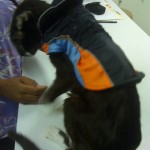Caring for Your Older Pet
Caring for Your Older Pet
We all value the affection we share with our pets. Nothing helps that friendship last more than working with your veterinarian to maintain your pet’s health and quality of life. As your pet ages, changes occur in its physical condition that warrants veterinary care in addition to the annual check-up. You will want to develop a complete geriatric health maintenance program with your veterinarian to provide optimal care for your older pet.
At what age is my pet considered “old”?
The aging process varies with breed and lifestyle. Your veterinarian will follow these guidelines to help determine when your pet reaches the “golden years.”
Small dogs (less than 20 pounds) 9-13 years
Medium dogs (21-50 pounds) 9-11.5 years
Large dogs (51-90 pounds) 7.5-10.5 years
Giant dogs (over 90 pounds) 6-9 years
Cats (most breeds) 8-10 years
What do I do with my overweight pet?
Older pets are apt to gain weight as the body’s metabolism and the pet’s activity level slow down; therefore, food consumption must be balanced with the activity level of the pet. Your veterinarian can recommend appropriate exercise and a proper diet to meet your pet’s needs.
How often should I exercise my pet?
Regular exercise is important to maintain bone strength, muscle tone, and stamina. Taking daily walks and playing with your pet are excellent methods of promoting physical activity as well as enjoying their companionship.
However, if your pet has difficulty standing up or walking, a degenerative joint disease, or arthritis, may be the problem. Arthritis is a common ailment, especially in older dogs, often impairing the ability to stand or walk. There are many treatment options available for these conditions, You should schedule an appointment to discuss your pet’s specific needs (877) DR TRULI.
“I used to think pet strollers were an American indulgence. Then I met an old Pekingese whose arthritis prevented her from walking far at night with her mom and her Pekingese sister. Instead of staying behind, lonely, at home, and laying about, she rides in a stroller, smells the sites (so to speak) and rubs noses with her sister. The improvement in her mental health has made her joints ache less. She actually takes less painkillers since going out for ‘walks’ in the stroller!” says Doc Truli.
How important is dental care even though my pet is old?
Very important! Tooth loss and gum diseases are more common as your pet gets older. Dental problems may make eating painful for your pet. Tumors of the mouth and gums also are more likely to appear in an older pet. We will perform dental exams and recommend cleanings as determined by the condition of your pet’s teeth and will educate you on home dental care.
Should I groom my pet more often?
Weekly grooming is an ideal time to look for external parasites, as well as notice the general condition of the skin and especially the eyes, ears, mouth, paws, anus, and genitalia. Because your pet is getting older, it is important to know that skin problems may occur more often since the skin may be thinner, less elastic, and does not repair itself as quickly.
If it seems that your pet is losing more hair, it may be due to disease or because hair follicles are not as active as in the younger years. Tumors in and under the skin become more likely. If you happen to notice any abnormal odors, discharges, swellings, or lumps during grooming, report them to us immediately.
What other changes might I expect in my pet?
As your pet ages a number of degenerative changes may occur that can affect your pet’s behavior. Hearing and vision may appear to deteriorate. This decrease may be due to specific diseases involving the eyes or ears or may be related to various behavioral changes.
You might interpret this as simple aging, but it actually might be due to a treatable geriatric disease, such as cognitive dysfunction.
Signs of Cognitive Dysfunction
confusion
disorientation
decreased activity
changes in the sleep/wake cycle
loss of housetraining
signs which suggest a decrease in your dog’s interest in, or ability to interact with its environment or with you.
You also should be aware of any unusual changes in activity level and attitude, appetite, water intake, urination, bowel movements, or body weight. These and other signs of illness such as vomiting, diarrhea, coughing, or sneezing, should be promptly reported to your veterinarian.
How does a geriatric exam differ from my pet’s usual exam?
A geriatric exam is more extensive than a simple check-up. Your veterinarian will conduct a standard physical examination as well as oral and rectal examinations at least annually.
Along with these standard exams, your veterinarian will also examine your pet’s ears, eyes, and thyroid glands. Some laboratory work will be done, including a complete blood count and a urinalysis; however, endocrine and other laboratory tests may be done if your veterinarian feels that it’s necessary. It is important to establish a baseline of normal values for your pet in order to readily identify changes.
Even if your pet seems perfectly healthy, regular geriatric check-ups are important to manage many of the changes associated with aging. Dogs and cats over seven years of age should be examined by a veterinarian at least annually.
A complete geriatric health maintenance program can provide a means to target age-related health problems, institute preventive health care measures, and detect any disorders early enough to provide the appropriate medical attention. This program also educates you, the pet owner, on health risks to your older pet and preventive steps.
All of these components as well as following your veterinarian’s recommendations for exercise, administration of any medication, and a proper diet are essential to the health and quality of life of your older pet.
Read more about Pet Quality of Life, including moral issues surrounding invasive technical medical care and the Quality of Life Scales to help you assess your pet’s condition. We also offer Pet Loss Support resources for your time of need.
A Note About Geriatric Pets and Vaccines
Please do not load your older pet up with vaccines! There is much research that a few vaccines when they are younger protects a pet for life. If you are truly concerned, ask Dr. Truli about blood tests for vaccine antibody levels.
Dr. Sandra Truli Springer, VMD, CVA, CVFT, CVTP, CVCH, CTCVMP
“Truli holistic veterinary services” | Care provided in your home!
Greater Tampa Bay, Florida, USA
Call toll-free 1 (877) DR TRULI | (877) 378-785







